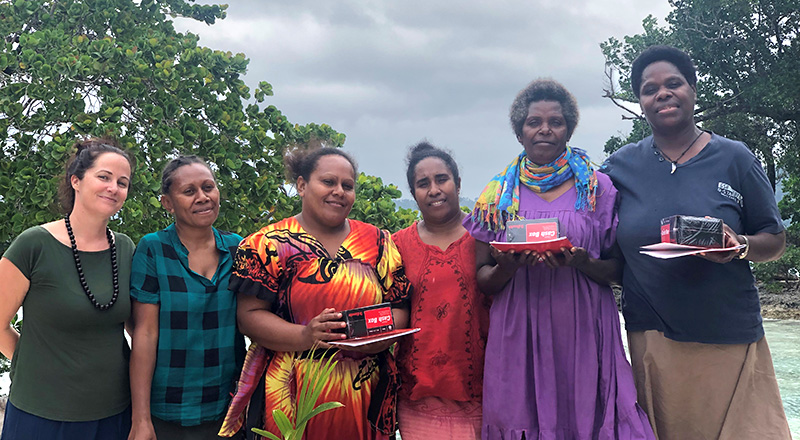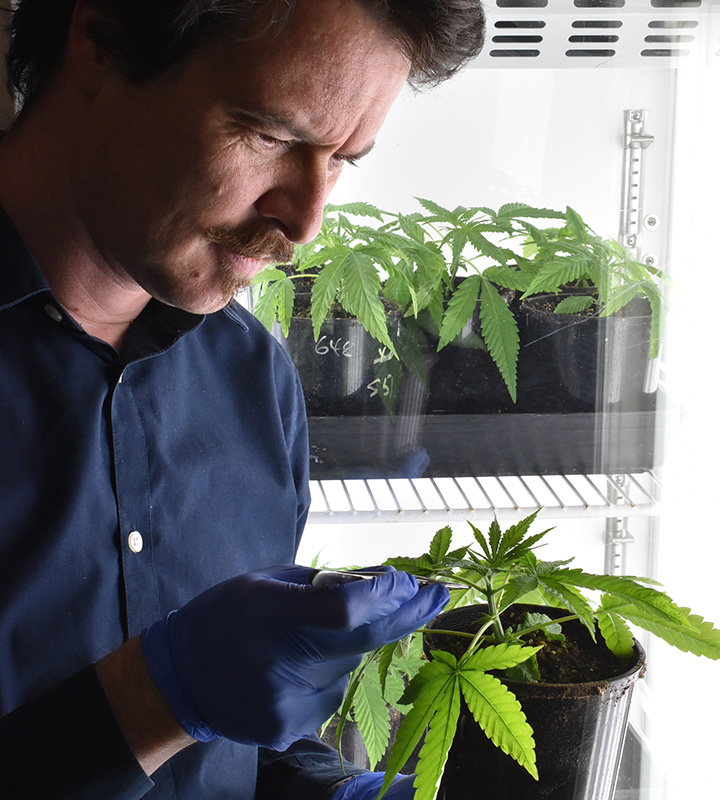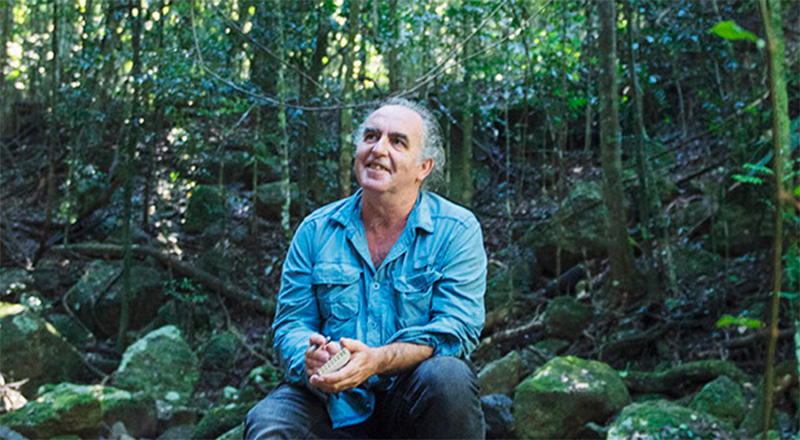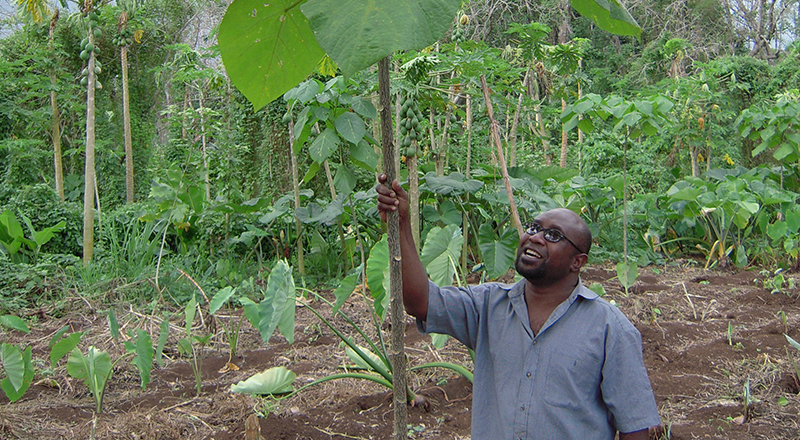Earth Sciences research
Overcoming the many challenges facing the world today — in particular of climate change and ecological crisis — requires an overall understanding of our natural world; one that encompasses all its species, ecosystems, elements and environments. In the area of Earth Sciences, Southern Cross University is a world leader.
Every day, individuals and teams from the Centre for Coastal Biogeochemistry, the Forest Research Centre, Southern Cross GeoScience, SouthernCross Plant Science and other specialised groups are out in the field.
Buoyed by the invaluable support of our industry partners, our scientists are not just asking questions; they are finding solutions. They do so by:
- Exploring complex natural systems, past and present environmental processes, and human-environment evolution and interaction;
- Integrating perspectives that range from the molecular level to the vast;
- Helping transform industries such as forestry, mining and agriculture to ensure environmentally appropriate outcomes, and;
- Expanding research into areas beyond the natural environment to incorporate new data around economics, infrastructure, sustainability and policy.
/prod01/channel_8/media/scu-dep/services/regenerativeag/images/Coastal-care-Associate-Professor-Damien-Maher-720-800.jpg)
Carbon project is working for our wetlands
Throughout the world, coastal wetlands serve as extremely valuable habitats. Yet while many are protected, there are constant challenges via the likes of pollution, development, sedimentation and climate change.
At Southern Cross University, Associate Professor Damien Maher is a biogeochemist and hydrologist exploring how coastal wetlands mediate climate change by locking up carbon from the atmosphere.
His research presents an exciting opportunity around restoring natural ecosystems, preventing further loss of biodiversity and improving coastal management.
Interestingly, findings are being informed by processes occurring away from the coast – in the ocean.
“Traditionally, it has been viewed that the soils of coastal wetlands are where we should look for carbon sequestered from the atmosphere,” says Associate Professor Maher.
“Some carbon, however, escapes from the soils and is carried out to the ocean, where it stays for thousands of years. This carbon, in the form of alkalinity, is helping the ocean to resist acidification.
“The task now is to quantify the amount of carbon being stored in the ocean and then translate that data and value into new strategies towards the restoration of our precious coastal wetlands.
“There is growing interest in this hypothesis because it gives a tangible value to our coastal wetlands.”
Associate Professor Maher’s research began in Moreton Bay and has since extended to Darwin, down Australia’s east coast and as far as the Florida Everglades in the United States. The Australian Research Council is supporting the project.
/prod01/channel_8/media/scu-dep/services/regenerativeag/images/Hanabeth-Luke-in-field-2019-720X475.jpg)
Australian farmers tell their stories
In terms of its contribution to social, economic and environmental sustainability, there can be no underestimating the importance of farming in Australia.
But what of the farmers themselves? How do they manage their farms? What are their views on farming, what are their aspirations, and what challenges do they face?
Southern Cross University’s Dr Hanabeth Luke is bringing together science and rural sociology through research that seeks to understand the many factors shaping landholder decision- making in Australian farming systems.
Her unique approach is focusing on the connection between social and environmental impact, which can in turn inform understanding on behaviour around climate change, soil degradation and other issues.
With funding from the Soil CRC (Cooperative Research Centre) and working with Charles Sturt University, Dr Luke’s project will apply and extend a methodology developed by Southern Cross University Adjunct Professor Allan Curtis.
Dr Luke is addressing a Soil CRC milestone to conduct surveys across six Australian farming
regions, starting in North Central Victoria and South Australia’s Eyre Peninsula, before heading to Western Australia then back eastwards.
“There is a strong emphasis on finding out how farmers manage their soils,” says Dr Luke.
“We are working with scientists and practitioners in the Soil CRC to assess the extent to which new technologies and innovations may be taken up by Australia’s farmers.
“We will also be asking farmers questions about their motivations for being a farmer. Is it about money, or is it also tradition, identity and/or a love for nature?
“Most importantly, how do farmer values influence their on-farm decision-making?”
Other topics include land management succession planning; best practice; the use of phosphates and pesticides; and perceptions around risk, trust, climate and the management of resources.
“The farming groups we’ve met have been very supportive, working with us to develop regionally relevant surveys to support strategic planning,” says Dr Luke.
/prod01/channel_8/media/scu-dep/research/images/macadamia.jpg)
Macadamia industry's state of origin
A single Australian tree may be the source of the $3 billion international macadamia industry, according to research from Southern Cross University and the University of Queensland.
Understanding the genetic diversity of trees in the wild helps to improve traits such as disease resistance and climate variability. Uncovering origin will also inform future breeding programs and enhance species conservation.
Although macadamia is native to Australia, most of the world’s cultivated trees are varieties that were bred in Hawaii. However, Dr Catherine Nock and UQ’s Dr Craig Hardner have mapped those varieties back to wild trees in Australia.
It means this rapidly growing global industry may indeed have originated from seed collected from a single tree, or perhaps a couple of trees, near Gympie in southeast Queensland, and taken to Hawaii in the late 19th century.
“It was a bit of a shock to see just how narrow the gene pool was from which the Hawaiian
varieties were developed,” says Dr Nock, who is based at Southern Cross Plant Science at Southern Cross University.
“Macadamia is native to the lowland rainforests of subtropical Australia and the varieties grown in orchards are only a few generations removed from their wild ancestors. We are extending our research to include the other macadamia species and a greater range of wild trees.”
While the scientists have found extensive genetic variation in the wild, Dr Nock says all species are threatened by human development and settlement.
Research partners include the University of Queensland, Macadamia Conservation Trust, Australian Macadamia Society, Hort Innovation Australia and the NSW Government.
/prod01/channel_8/media/scu-dep/services/regenerativeag/images/Professor-Andrew-Rose-800-440.jpg)
Connecting industrial waste to food security
Professor Andrew Rose describes his research as local focus with a global reach.
With a view to ensuring food security in Australia and internationally, the Southern Cross University scientist is striving to develop new strategies around industrial waste management.
He has joined forces with northern NSW-based food processing companies Norco and Richmond Dairies, as well as the Richmond Valley Council, for research into waste recycling.
“As demand for food resources increases, so does demand for the water, nutrients and energy needed for food production,” he says.
“Water is already in critically short supply during drought periods, which are predicted to become more prevalent with ongoing climate change, while supplies of cheap and readily available phosphorus – an essential nutrient for plant growth – are expected to be permanently depleted in the next 50-100 years.
“Finding new ways that are affordable and reliable to recover these scarce resources from wastes is therefore critical to ensuring food security in Australia and the world over the coming decades.”
Currently, large amounts of waste go to landfill. Professor Rose is hoping to develop technologies to recover nutrients such as phosphorous, or even to convert waste for positive use in farm-safe land applications.
“We are also exploring ways of using waste to generate energy,” he says.
Professor Rose is internationally known for his work on the role of chemical processes in aquatic systems in natural and engineered systems, particularly involving iron.
“Iron is deliberately coagulated for water/ wastewater treatment because it grabs on to contaminants,” he says.
“Being particles, these contaminants can be separated. There’s a lot of industrial potential and value in that.
“More broadly, iron is a vital micronutrient for photosynthesis and other metabolic reactions.
“However, in marine waters a scarcity of iron may limit biological growth, while an excess of iron may contribute to environmental events such as algal blooms.”
Leadership programs developed by Southern Cross University’s Dr Cherise Addinsall are empowering rural women in Vanuatu and Fiji.
A social scientist trained across disciplines in environmental science, sustainable tourism and business and gender studies, Dr Addinsall has been working on Australian Centre for International Agricultural Research projects in the region for the past seven years.
She and local teams have developed models to engage and empower rural women through interactive training conducted in a non- threatening environment.
“This is based on the principle of storian – a Bislama term for sharing and swapping stories – through which women recognise the skills and leadership roles they already have in the community, while also identifying other possible leadership pathways,” says Dr Addinsall.

Benefits include improved agricultural productivity; improved financial management and access to micro-finance; gender inclusive decision-making; and the confidence to contribute to discussions in the household and community.
Dr Addinsall’s methods are guided by the Agroecology and Sustainable Rural Livelihoods Framework, which was an outcome of her PhD research. It acknowledges the importance of tradition and culture in sustainable and resilient livelihood systems.
“Many research and development projects operating in the South Pacific see any changes from non-monetary provisions of goods and services to the cash market as an improvement in livelihoods,” she says.
“However, it is vital that this does not corrode the fabric of traditional and social life and values. In Melanesia, the traditional economy and customary land tenure outweigh the cash economy in terms of providing for livelihoods.
“The traditional economy is also seen as key to keeping households resilient, particularly in times of hardship and external threats such as natural disasters and global recessions.
“Furthermore, it is where women play a significant role through maintaining subsistence gardens, caring for the elderly, children, disabled or ill, volunteer labour and other activities.”
Throughout the world, demand is building for high quality, natural, safe and novel foods and other agricultural products.
Hemp is one example, and Southern Cross University’s Associate Professor Tobias Kretzschmar believes controlled cultivation of hemp offers considerable benefits for Australia.
“Australia is very suitable for growing hemp. It’s a promising broadacre crop, it doesn’t mind dry
conditions and is a multipurpose crop as well,” he says.
“However, hemp is also a polarising product – socially, politically and legally – and that has been the case for a long time.
“It’s an important issue because, scientifically and agriculturally, hemp has enormous potential in terms of its cultivation and processing for food, fibre and medicine into the future.
“For instance, there is a burgeoning market for hemp as a food crop through direct feeding and fodder, while demand for hemp products from the upscale nutraceutical market currently far outstrips supply.”

At Southern Cross Plant Science, Associate Professor Kretzschmar’s hemp research is under licence from the NSW Department of Primary Industries. He works with several private sector partners.
“Hemp is an understudied product. In our hemp research stream, we are involved with processes such as genetics, chemo/pheno-typing to build plant profiles, and the characterisation and maintenance of germplasm,” he says.
Germplasm refers to the genetic material from cells, such as seeds and tissue. In fact, Associate Professor Kretzschmar sees great advantage in Southern Cross University becoming a national gene bank for these living genetic resources.
“This would not only create a safe and central hub for germplasm collection and ongoing research, we could also provide government, business and industry with the latest data, and keep tight controls over the supply of germplasm.”
German-born, Associate Professor Kretzschmar has vast experience that over the years has seen him study pineapples in Townsville, rice in the Philippines and petunias in Switzerland.
His research at Southern Cross University is similarly diverse, covering passionfruit, coffee, mustard, rice, tea tree ... and now hemp.
Southern Cross University research is helping frog species to combat extinction threats posed by climate change and disease.
High in the rainforest mountains of Northern New South Wales, Dr David Newell and his team of postgraduate students use remote recording equipment to enhance understanding of the plight of montane rainforest frogs.
As Dr Newell poetically puts it, these burrowing frogs live “up where the streams start, in their islands in the sky”.
“But these frogs cannot go any higher up the mountains for the climates they require.
“By recording their calls, we can analyse patterns, match them against temperature and rainfall readings, and better understand when is the best time to detect them.
“When we began, these species were known only at a few locations. Through our survey and monitoring work, we are now aware of many more sites and can work with managers to protect their habitats into the future.”

Dr Newell’s research is supported by the Australian Research Council and the NSW Government’s Saving Our Species program.
It includes the study of another endangered species – Fleay’s barred frog.
“Since the late 1970s, we’ve been aware of frog declines and losses within the rainforests of the Australian east coast,” says Dr Newell.
“What was unusual is that it was occurring in well- conserved, World Heritage areas.
“It turns out they were falling prey to a fungal disease – chytridiomycosis – a condition that has placed frogs at the very forefront of global extinction rates.”
The good news is that incidences of recovery and reversal have occurred, with Fleay’s barred frog an encouraging example.
“Questions remain about whether the pathogen is becoming less virulent, or whether species are developing a resistance,” says Dr Newell.
“What we learn may help advance recovery strategies for other threatened species both in Australia and globally.”
A native plantation project in Vanuatu is an ideal example of the saying “from little things, big things grow”. Economic and other benefits are the result.
Southern Cross University’s Dr Kevin Glencross is a key researcher for the initiative that is helping transform the Pacific Island nation from a timber importer to timber producer.
The integration of food crops such as sweet potato, corn, peanuts, leafy vegetables, yams, fruits and nuts is further boosting local livelihoods.
“Vanuatu has many promising species for plantation growth, but until recently there had been little work done on reforestation or establishing and advancing a viable industry,” says Dr Glencross.
“While issues around land tenure are complex and traditional methods can be challenging, there is a wealth of cultural knowledge and social awareness that informs what we do.”

One of the project’s great strengths is diversity. Dr Glencross says that along with greater opportunities for women, families are able to stay together, communities have shared goals and agroforestry methods carry benefits for sustainability.
Potential also exists via export markets and import replacement. That’s why researchers are studying the growth of cyclone-resistant trees and other more resilient species.
“The trees are grown for timber, fruit, nuts, oil and cosmetics. Integrated crops mean there is no lag as the trees are growing, and we are now looking at expanding into cocoa and coffee,” says Dr Glencross.
“Tourism is Vanuatu’s major economic driver, but 80 per cent of food at resorts is imported. Our drive towards locally grown produce is economically sound, culturally significant and is becoming more accepted by resorts and their guests.”
Supported by the Australian Centre for International Agricultural Research, Dr Glencross is also collaborating with Alternatives Communities Trade in Vanuatu – which supports Ni-Vanuatu ethnic communities through the fair trade of local products to generate sustainable incomes – the Department of Forests and education groups.

/prod01/channel_8/media/scu-dep/current-students/images/Coffs-harbour_student-group_20220616_33.jpg)
/prod01/channel_8/media/scu-dep/current-students/services/counselling/images/RS21533_English-College-Student_20191210_DSC_6961.jpg)
/prod01/channel_8/media/scu-dep/study/scholarships/images/STEPHANIE-PORTO-108-2.jpg)
/prod01/channel_8/media/scu-dep/study/arts-and-humanities/images/RS20958_Chin-Yung-Pang-Andy_20190309__79I5562-960X540.jpg)
/prod01/channel_8/media/scu-dep/experience/images/SCU-INTNL-STUDY-GUIDE-280422-256.jpg)
/prod01/channel_8/media/dep-site-assets/component-library/screenshots/online-1X1.jpg)